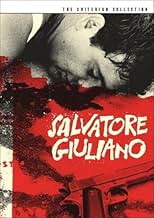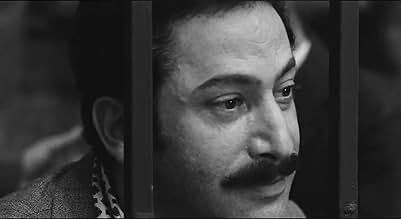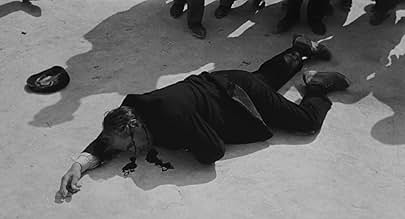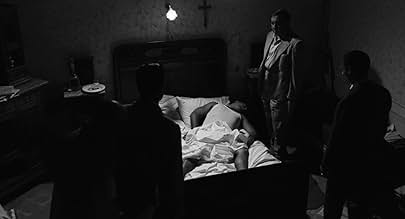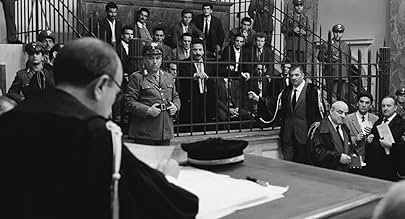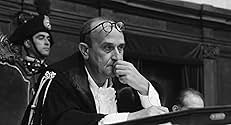IMDb RATING
7.3/10
5.3K
YOUR RATING
The unclear and complicated twists between governal powers, independentist party and Mafia in the Sicily of the '40s culminate with the death of Salvatore Giuliano.The unclear and complicated twists between governal powers, independentist party and Mafia in the Sicily of the '40s culminate with the death of Salvatore Giuliano.The unclear and complicated twists between governal powers, independentist party and Mafia in the Sicily of the '40s culminate with the death of Salvatore Giuliano.
- Awards
- 6 wins & 4 nominations total
Frederico Zardi
- Pisciotta's Defense Counsel
- (uncredited)
Pippo Agusta
- Minor Role
- (uncredited)
Sennuccio Benelli
- Reporter
- (uncredited)
Giuseppe Calandra
- Minor Official
- (uncredited)
Pietro Cammarata
- Salvatore Giuliano
- (uncredited)
Max Cartier
- Francesco
- (uncredited)
Nando Cicero
- Bandit
- (uncredited)
Pietro Franzone
- Seperatist
- (uncredited)
Giovanni Gallina
- Bit Part
- (uncredited)
Vincenzo Norvese
- Bit Part
- (uncredited)
Carmelo Oliviero
- Don Nitto Minasola
- (uncredited)
Renato Pinciroli
- Pinciroli
- (uncredited)
Francesco Rosi
- Narrator
- (voice)
- (uncredited)
Giuseppe Teti
- Priest of Montelepre
- (uncredited)
Cosimo Torino
- Frank Mannino
- (uncredited)
Featured reviews
Interesting neo-realistic, quasi-documentary film with notable editing. But did the film deserve the Best Director award at Berlin over Bergman's "Through a glass darkly"? The Swedish film was superior. Martin Scorsese likes it because he can identify with the Italian politics and sociology of that time. The Rosi film is good but overrated.
Through the first hour of this film there are no focused characters, at most a character is seen in two or three short scenes. It's basically just following history and showing examples of it. Luckily it's not rushed, it's decently paced and it is realistic.
The best way to describe this is to call it a docu-drama. A narrator tells you something and then some people either do what's described or continues where the narrator leaves off. Though this approach can work, I did find it distancing in this film and it did make me less interested. The above competent direction and photography did elevate it however and for a long time I felt that it was great.
The films main problem is that we never really get to know anything, least of all about the title character who is despite the entire film being about his history only seen dead, or walking/running around. He only has a few lines.
Then towards the middle we experience two horrendous acts of overacting which damages the film severely. Both involving screaming/crying, the worst offender was the woman playing Giulianos mother. She screams and cries so awfully and in such a high tone that you wonder if you are watching a cheap parody. This scene is agonizingly long.
We do however learn a lot about the conflict going on and after a bit more than an hour, perhaps closer to 90 mins we get one character to follow. Overall I just don't think the film put us inside the conflict and despite giving us historical facts and let us understand the events we never got to the core. This made it cold and somewhat uninteresting for time to time. Not a film I would recommend but definitely a more or less good film.
6.5/10
The best way to describe this is to call it a docu-drama. A narrator tells you something and then some people either do what's described or continues where the narrator leaves off. Though this approach can work, I did find it distancing in this film and it did make me less interested. The above competent direction and photography did elevate it however and for a long time I felt that it was great.
The films main problem is that we never really get to know anything, least of all about the title character who is despite the entire film being about his history only seen dead, or walking/running around. He only has a few lines.
Then towards the middle we experience two horrendous acts of overacting which damages the film severely. Both involving screaming/crying, the worst offender was the woman playing Giulianos mother. She screams and cries so awfully and in such a high tone that you wonder if you are watching a cheap parody. This scene is agonizingly long.
We do however learn a lot about the conflict going on and after a bit more than an hour, perhaps closer to 90 mins we get one character to follow. Overall I just don't think the film put us inside the conflict and despite giving us historical facts and let us understand the events we never got to the core. This made it cold and somewhat uninteresting for time to time. Not a film I would recommend but definitely a more or less good film.
6.5/10
Review of Salvatore Giuliano (1962)
Directed by Francesco Rosi, Salvatore Giuliano (1962) is a gripping, politically charged Italian film that blends the genres of crime drama and historical reconstruction. The film portrays the life and death of Salvatore Giuliano, a real-life Sicilian bandit who became a legendary figure in post-war Italy. Giuliano's story is tragic, marked by his transformation from a rebellious hero to a notorious outlaw and his eventual murder under mysterious circumstances.
Rosi's approach to the material is unique. The film doesn't rely on a traditional narrative structure but instead unfolds in a fragmented, almost documentary-like fashion, presenting the story from various perspectives. This method of storytelling creates a sense of disorientation, mirroring the confusion and corruption of the political and social forces at play in post-WWII Sicily. By juxtaposing the personal tragedy of Giuliano with the larger political landscape of Italy, the film reveals the complex intersections between crime, politics, and the Sicilian mafia.
The performances are strong, with a particularly noteworthy portrayal of Giuliano by Marcello Mastroianni, whose quiet intensity brings depth to a character that is both a symbol of resistance and a product of the violent environment in which he lives. Rosi's direction maintains a cold, observational tone, which works well to emphasize the film's themes of disillusionment and betrayal.
Visually, the film is stunning, with cinematography that captures the stark beauty of the Sicilian landscape while also reflecting the harsh realities of life for the people caught in the web of organized crime and political corruption. The stark black-and-white visuals, coupled with the atmospheric score by Francesco De Masi, enhance the film's somber and tense mood.
Salvatore Giuliano is an excellent example of the political cinema that emerged in Italy during the post-neorealist era. It's not just a crime story; it's an exploration of the corruption and disillusionment that permeated Italian society during the 1940s and '50s. While the film might feel slow or fragmented at times, its depth and ambition make it a fascinating and insightful watch for those interested in the intersection of politics, history, and cinema.
Rating: 4/5 - A thought-provoking, well-crafted historical drama that shines a light on the murky intersection of crime and politics in post-war Sicily.
Directed by Francesco Rosi, Salvatore Giuliano (1962) is a gripping, politically charged Italian film that blends the genres of crime drama and historical reconstruction. The film portrays the life and death of Salvatore Giuliano, a real-life Sicilian bandit who became a legendary figure in post-war Italy. Giuliano's story is tragic, marked by his transformation from a rebellious hero to a notorious outlaw and his eventual murder under mysterious circumstances.
Rosi's approach to the material is unique. The film doesn't rely on a traditional narrative structure but instead unfolds in a fragmented, almost documentary-like fashion, presenting the story from various perspectives. This method of storytelling creates a sense of disorientation, mirroring the confusion and corruption of the political and social forces at play in post-WWII Sicily. By juxtaposing the personal tragedy of Giuliano with the larger political landscape of Italy, the film reveals the complex intersections between crime, politics, and the Sicilian mafia.
The performances are strong, with a particularly noteworthy portrayal of Giuliano by Marcello Mastroianni, whose quiet intensity brings depth to a character that is both a symbol of resistance and a product of the violent environment in which he lives. Rosi's direction maintains a cold, observational tone, which works well to emphasize the film's themes of disillusionment and betrayal.
Visually, the film is stunning, with cinematography that captures the stark beauty of the Sicilian landscape while also reflecting the harsh realities of life for the people caught in the web of organized crime and political corruption. The stark black-and-white visuals, coupled with the atmospheric score by Francesco De Masi, enhance the film's somber and tense mood.
Salvatore Giuliano is an excellent example of the political cinema that emerged in Italy during the post-neorealist era. It's not just a crime story; it's an exploration of the corruption and disillusionment that permeated Italian society during the 1940s and '50s. While the film might feel slow or fragmented at times, its depth and ambition make it a fascinating and insightful watch for those interested in the intersection of politics, history, and cinema.
Rating: 4/5 - A thought-provoking, well-crafted historical drama that shines a light on the murky intersection of crime and politics in post-war Sicily.
Francesco Rosi's cinema are around political matters, a tough subject too swallow for usual cinephiles, due the hard life which we lives are enough to stand, but some facts needs a better understanding as this picture suggests, how Sicily gets his independence from Italy is plentiful explained here, each facts were expose in this overlong picture, but Francesco wisely put forward a cursed triangle of forces, the mob, the separatists and the dangerous outlaws who help them in hope to get their crime's amnesty, after they got Sicily's autonomy starts another hard issue, the communist, such thing was totally inconceivable to Italian standards at it's time, a mass killing was prompt provides by the rich farmers and also by the mob, the Giuliano the leader almost didn't appears on the movie, his second on command and your fellows conrades in-arms were charged by the massacre, interesting picture over this dry land on Italy's south, the mountainous island Sicily !!!
Resume:
First watch: 2019 / How many: 1 / Source: DVD / Rating: 8
Resume:
First watch: 2019 / How many: 1 / Source: DVD / Rating: 8
Francesco Rosi's elliptical film about the notorious Sicilian gangster is quite stunning. This is not, however, a typical gangster film. This film is more about the lives of the people affected by Giuliano than about the gangster himself and this is given extra resonance by the casting of the real villagers in almost all cases. The fact that we never see Giuliano's face makes the director's intentions quite clear.
Giuliano began his professional criminal career when he was caught stealing at a young age and chased out of his village into the surrounding hills where he formed a gang and made a living from robberies and standover tactics. He became feared and respected by the locals and was eventually recruited by regional officials to help in the fight for independence from Italy. The first half of the film explores these events and manages to convey an extremely strong feeling for the time and place. The second half of the film deals with the trial of the surviving members of Giuliano's gang after his death and in doing so illuminates much of what has come before.
It is remarkable how well the film holds together considering the amount of different styles and techniques that were combined in its creation. There are elements of docudrama, courtroom drama, Italian neorealism, crime story and political tract. It is also surprising how well it holds up over forty years later.
Giuliano began his professional criminal career when he was caught stealing at a young age and chased out of his village into the surrounding hills where he formed a gang and made a living from robberies and standover tactics. He became feared and respected by the locals and was eventually recruited by regional officials to help in the fight for independence from Italy. The first half of the film explores these events and manages to convey an extremely strong feeling for the time and place. The second half of the film deals with the trial of the surviving members of Giuliano's gang after his death and in doing so illuminates much of what has come before.
It is remarkable how well the film holds together considering the amount of different styles and techniques that were combined in its creation. There are elements of docudrama, courtroom drama, Italian neorealism, crime story and political tract. It is also surprising how well it holds up over forty years later.
Did you know
- TriviaMartin Scorsese credits this film as being one of his many inspirational sources for the look and style of his Taxi Driver (1976).
- GoofsWhen his mother comes to view and identify his corpse, Salvatore's stomach clearly moves as the actor struggles to control his breathing.
- ConnectionsEdited into Il sasso in bocca (1970)
- How long is Salvatore Giuliano?Powered by Alexa
Details
- Release date
- Country of origin
- Language
- Also known as
- Wer erschoß Salvatore G.?
- Filming locations
- 98 Via Serafino Mannone, Castelvetrano, Trapani, Sicily, Italy(Giuliano's body)
- Production companies
- See more company credits at IMDbPro
- Runtime2 hours 3 minutes
- Color
- Sound mix
- Aspect ratio
- 1.85 : 1
Contribute to this page
Suggest an edit or add missing content


